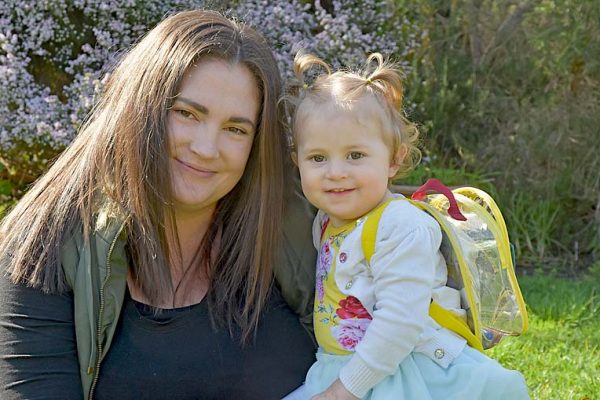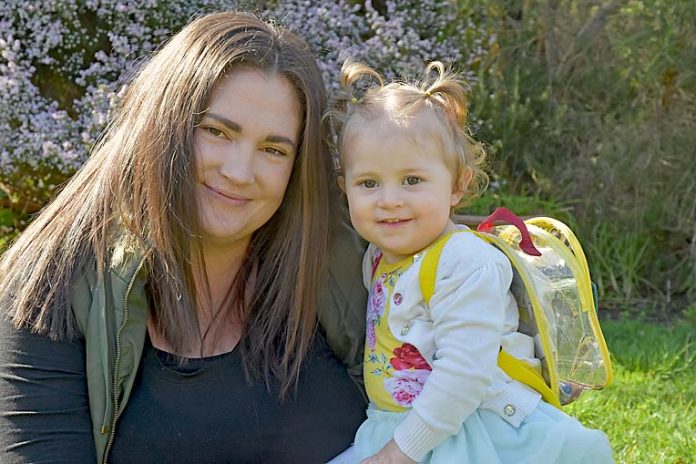
Picture: BROOKE LITTLEWOOD
IMAGINE physically or emotionally hurting a loved one and waking up the next day with no recollection of what you had done.
For Sophie Little, the pain of not knowing has been all too real as she battles type two bipolar, a mental illness characterised by cycles of depressive episodes followed by hypomanic periods.
Sophie, 28, said she always knew something was not quite right and she had trouble controlling her moods from a young age.
She believed her mental illness was always there waiting to surface, but it was not until she was 18 she really started to struggle.
“For many years I knew something was wrong,” she said.
“I battled with self-harm, depression and anxiety in high school.
“When I turned 18, things became progressively worse and one night I was admitted to hospital for treatment and my own protection.
“I have very few memories of this time.”
“I had no choice but to get help … I knew I had a big problem.
“I was lucky that my mum knew the right places to get me help and supported me all the way.”
It took over a year of hospital admissions and manic/depressive episodes before Sophie was given a formal diagnosis.
She visited numerous doctors, attended counselling and tried many combinations of medications until she found “the right ones” for her illness.
The medication changes had to be tested in hospital as she was too unstable to cope.
For Sophie, the scariest part of suffering with bipolar, anxiety and depression was feeling out of control.
“Not being able to control your feelings and emotions is terrifying,” she said.
“I always had more depressive episodes than manic and my manic episodes were milder.
“I would spend too much money or drink too much … just reckless behaviour.
“My depressive episodes were made up of extreme anger and sadness, it was hard not being in control.”
As Sophie started to lose control of her emotions, she also noticed friendships started to dissolve.
She was not sure whether this was due to a lack of understanding what was happening or because people did not want to deal with what she was going through.
“I was isolated as I lost most of my friends,” Sophie said.
“They moved on with their lives while I was stuck trying to work out how to make it through each day.
“I do not blame them and I hold no resentment, but most people did not want to deal with me.”
Nowadays, despite rarely having any issues, Sophie still needs medication to manage her illnesses.
She says she will never recover from bipolar and will need treatment for the rest of her life.
However, she now knows what her “triggers” are and how to deal with her moods.
At her worst, she is unable to work or maintain social relationships and when she is “managing” everything feels normal.
“A bad day used to mean feeling unmotivated, sad, anxious, angry and irritable, but now I know how to manage it,” she said.
“Once upon a time a bad day was when I would have a depressive episode and I would become angry, aggressive and violent.”
Sophie has learned to cope by taking her medication, having plenty of sleep and talking.
She encourages people to educate themselves and realise mental illness is like any physical illness.
“You would never tell someone with a broken leg to get over it,” she said.
“It is important to talk … mental illness is isolating.
“Offer an ear or a shoulder, find someone to listen and no matter how abnormal you feel, you are not alone … you are never alone.”
As someone who has battled mental illness, there are a number of improvements Sophie believes could be made to services in the South East, including support groups for friends and family, as well as those diagnosed.
It has been 10 years since Sophie’s diagnosis and she said she still battles internally every day, but it is just not as hard as it used to be.
“Life is good now,” she said.
“I have two beautiful children, I have a stepdaughter and I have a wonderful partner who supports me.
“I have new friends and my family are still an amazing support.
“Nowadays, I do everything for my kids.
“I keep my mental state as healthy as possible because they need me.”
• Sophie spoke about her condition in the lead up to R U OK? Day, which is on Thursday.








